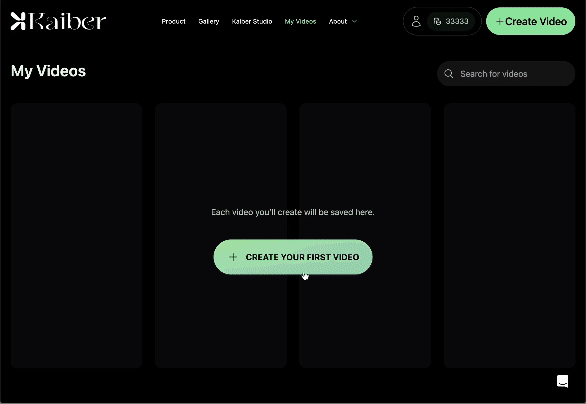TL;DR:
- Kaiber, known for music videos of Kid Cudi and Linkin Park, launches a new mobile app with AI tools.
- The app offers text-to-video, image-to-video, and video-to-video features for creators.
- Users can choose between two animation styles and customize camera movements and aspect ratios.
- Kaiber’s app allows users to add their own music, making it an affordable option for independent artists.
- The app also features an Audio Reactivity function, syncing content with uploaded audio.
- Kaiber introduces a “Create with” feature, partnering with three independent artists.
- Commercial rights vary based on the account type, with paid users owning their videos.
- The app offers an affiliate program, enabling creators to earn commissions.
- Subscription tiers include Explorer, Pro, and Artist, with a free trial available.
- Kaiber has rapidly gained popularity, serving millions of users and earning seven figures in revenue.
Main AI News:
In a groundbreaking move, Kaiber, the pioneering generative AI creative studio renowned for crafting music videos for global sensations like Kid Cudi and Linkin Park, has unveiled its latest mobile application. This cutting-edge toolset is poised to revolutionize the creative landscape by granting creators, musicians, and artists access to a suite of AI-powered features, encompassing text-to-video, image-to-video, and video-to-video capabilities.
Established in 2022, Kaiber harnesses the potential of various open-source projects, including AnimatedDiff, Automatic1111, ControlNet, and Deforum, among others. Complementing these resources is a proprietary layer of technology that seamlessly amalgamates them into a singular artistic powerhouse.
Much like its counterparts in the AI video generation space, such as Runway, Meta’s Make-A-Video, and Google’s Imagen Video, Kaiber empowers users to either upload images/videos or input their own concepts for generating animated content.
Kaiber distinguishes itself by offering two distinct animation styles: “Flipbook,” characterized by a frame-by-frame effect, and “Motion,” an elegant style in which content flows seamlessly between frames. Users have the flexibility to define their desired visual aesthetics or choose from Kaiber’s pre-structured themes and styles.
Furthermore, Kaiber enables users to fine-tune camera movements, including zooming, rotation (clockwise or counterclockwise), and lateral shifts (up, down, left, or right). It accommodates various aspect ratios tailored to specific platforms, such as 16:9 for YouTube, 9:16 for TikTok, and 1:1, 3:4, or 4:3 for Instagram. While currently limited to eight minutes, Kaiber has plans to support longer video durations in the near future, with a 30-minute video generation timeframe.
The app’s versatility extends to audio customization, allowing users to integrate their own music. This feature positions Kaiber as an affordable alternative for independent artists, sparing them the exorbitant costs typically associated with animation studios. Furthermore, Kaiber boasts an Audio Reactivity feature, enabling content to synchronize with the user’s uploaded audio.
Victor Wang, co-founder, and CEO of Kaiber, emphasizes the app’s user-centric approach, stating, “Our mobile app brings Kaiber’s core capabilities—such as text-to-video, image-to-video, and video-to-video—into a compact, user-friendly format. While some advanced tools like comprehensive storyboarding and specific text-to-video models remain web-exclusive, customers should expect feature parity very soon.”
To commemorate the app’s launch, Kaiber has partnered with three independent artists, offering a unique “Create with” feature exclusively for mobile users. This feature tailors generative AI styles and music options to each artist’s unique style. Notably, one of these featured artists is Eric Gao, the co-founder and CTO of Kaiber, known by his stage name, Oksami. With over 53,000 Spotify listeners and nearly 58,000 YouTube subscribers, Gao brings his music, including the popular track “Midnight Diner” with over 1 million streams on Spotify, to the platform. The other two artists featured are Yung Bae and August Kamp.
In terms of commercial rights, users who opt for a paid account retain ownership of the videos they create, while free account holders receive a Commons Noncommercial 4.0 Attribution International License, permitting content usage but prohibiting commercialization. Videos created with a free account will bear the Kaiber logo watermark.
Kaiber also offers an enticing affiliate program, enabling creators to earn a 10% commission on subscription referrals. Affiliates continue to reap commissions for as long as their referred customers remain subscribers.
The Kaiber app is available on both iOS and Android devices, offering three subscription tiers: Explorer ($5/month for 300 credits), Pro ($15/month for 1,000 credits), and Artist ($30/month for 2,500 credits), with one credit equating to one second of video. The credit cost varies depending on the specific feature employed. A seven-day free trial, accompanied by 100 credits, is available to new users.
Jacky Lu, co-founder and head of creative at Kaiber, elucidates the company’s vision, stating, “Our core thesis is that the creative process is hard. But the creative process has common denominators across all modalities like music, video, images, and other forms of art—humans make stuff in similar patterns. And to make the best art, we need intuitive and simple tools and the ability to be inspired by others. Now, with gen AI, we can make art with others and with machines.”
Having transitioned from beta in May, Kaiber has rapidly amassed over 5 million sign-ups, propelled by the acclaim received for Kid Cudi’s AI-powered lyric videos, Linkin Park’s AI music video, and the viral TikTok trend “Astral Jump.” Through its subsidiary, Kaiber Studios, the company has extended generative audio and video support to over 2 million artists, including luminaries like Grimes, Wu-Tang Clan, Money Man, Don Diablo, and Mike Shinoda.
Conclusion:
Kaiber’s innovative app has the potential to disrupt the creative industry by empowering artists with AI-driven music video creation tools. It addresses the needs of independent artists, offers customization, and presents opportunities for monetization through commissions. This development reflects a growing trend in the market towards democratizing creative processes and leveraging AI for artistic endeavors.

